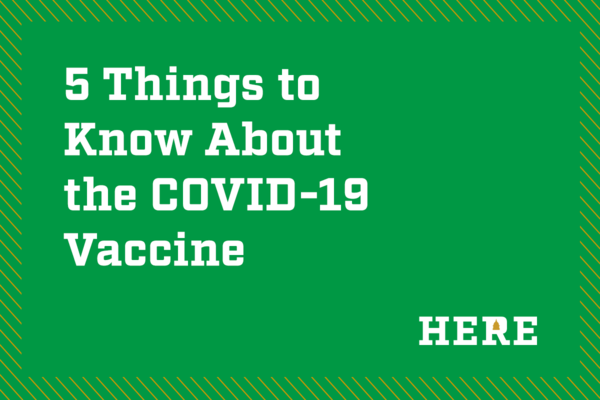

Throughout the pandemic, Dr. Ben Garman, medical director at the Notre Dame Wellness Center, has served as a member of the Emergency Operations Center (EOC) team, providing advice to University administrators. NDWorks sat down with Dr. Garman to talk about the safety of the COVID-19 vaccines. There are currently two vaccines authorized and recommended to prevent the virus: Pfizer-BioNTech’s COVID-19 vaccine and Moderna's COVID-19 vaccine.
Garman said, “A lot of people are a little hesitant to be vaccinated because they don’t know much about it or maybe they heard scary things on social media or from their friends. I think the best thing to do is to educate yourself, which is very important when it comes to anything about your health, but in particular a massive event like trying to vaccinate essentially the entire population as quickly as possible.”
Here are five things Dr. Garman wants you to know about the COVID-19 vaccine:
-
The creation of the vaccines was fast … and scientific.
“A very big portion of the time it takes to create a vaccine has nothing to do with the science involved in making the vaccine. It has to do with fundraising and convincing scientists to do your studies and convincing patients to sign up for your studies and going to big events to convince politicians to give you money. And none of that had to happen ... Many of the world governments basically wrote these companies a blank check saying, ‘Look, we know this is expensive, but we need this vaccine because this is a once-in-a-generation event and we want to get it out as safely, but as quickly, as possible. So here's a bunch of money. We're going to fund your project.’ The actual science part — having doctors and scientists sitting in labs, doing their work — wasn’t really rushed.”
-
The vaccines went through the customary three phases before receiving FDA approval.
“People have probably heard of multiple phases of testing that take place before receiving FDA approval for (pharmaceutical) products. With phase one, you determine, is it safe? If I am giving it to 20 volunteers, do any of them get any bad effects from it? And phase two is, what's the right dose? If I give it in a little tiny dose versus a really big dose, am I going to get the same effect? And then phase three is, does it work and is it safe? Usually there's a big gap between each of those phases because nobody traditionally gets enough money to run all three phases.”
-
Experiencing a serious reaction after being vaccinated is unlikely.
“With any vaccine, there's a very, very low chance of experiencing a significant adverse event from it. That would be an allergic reaction, and you have to maybe spend the night in the hospital to make sure that you don't swell up too much to the point where you can't breathe and get some medicine for that. So far, the data that's been published and talked about it in the scientific communities has not shown any evidence that these new vaccines are any more likely to cause that type of reaction. There's also the annoying, but less severe type of reaction where you just don't feel so good the next day, like some experience after getting a flu shot. I received my second vaccine on January 13. After my first vaccine, I had no symptoms at all. After my second vaccine, I had about 12 hours of mild symptoms, similar to how I feel when I get the flu shot every year. And other than that, I've had no ill effects.”
-
The vaccines protect against the new, more transmittable variants of COVID-19.
“It would be quite unusual for there to be a variant against which the vaccine doesn’t work. Pfizer said if (the vaccine) doesn't work, they could theoretically make a new vaccine in six weeks that would work against it.”
-
Getting vaccinated may be the most important health decision you make all year.
Dr. Garman believes what you do and what health professionals do are equally important. At a recent meeting with doctors and nurse practitioners at the Wellness Center, Dr. Garman told them, “This is literally the most important thing you're going to do as a primary caregiver this year to educate and alleviate fears of your patients getting this vaccine. I'm going to save more lives getting shots into arms than literally anything else I could do this year. Your normal colonoscopies and cancer screening and blood tests, none of that's going to save as many lives as getting this vaccine into people.”
Check HERE.nd.edu for more information. If you are currently eligible for the COVID-19 vaccination in your state, you are encouraged to make an appointment to get vaccinated.
Originally published by at ndworks.nd.edu on February 01, 2021.